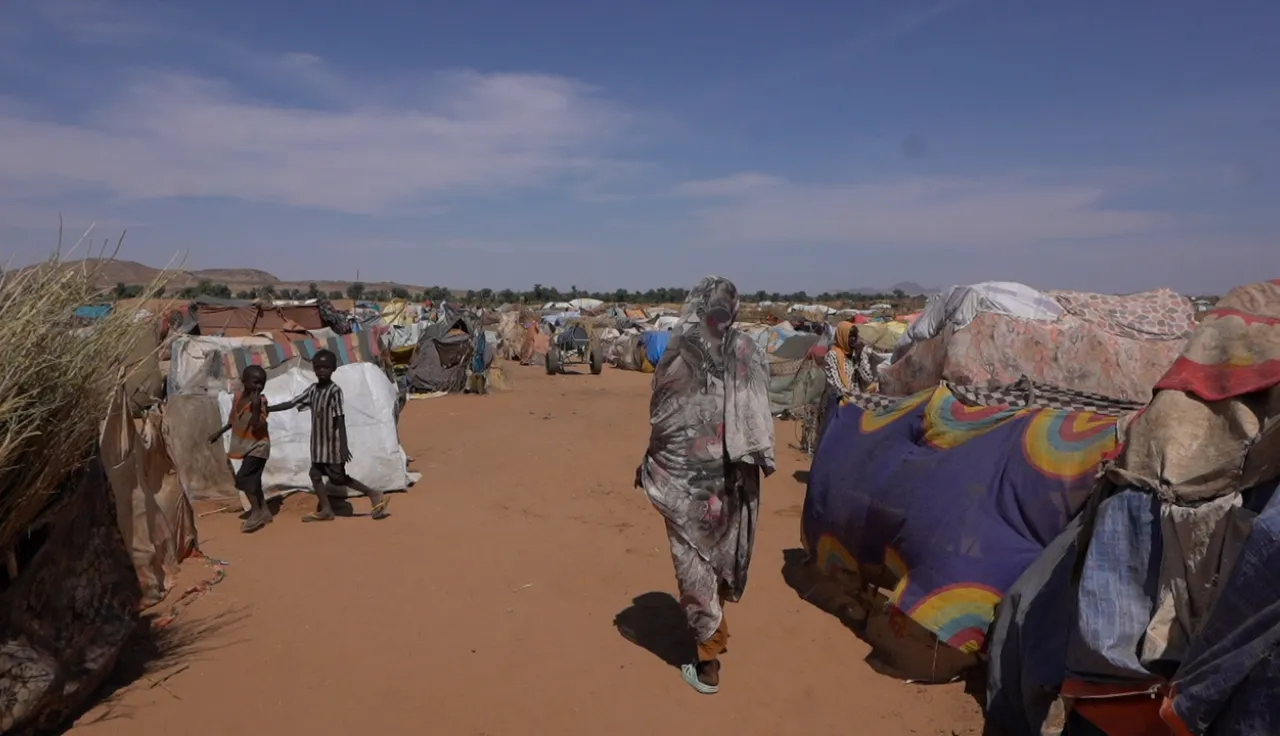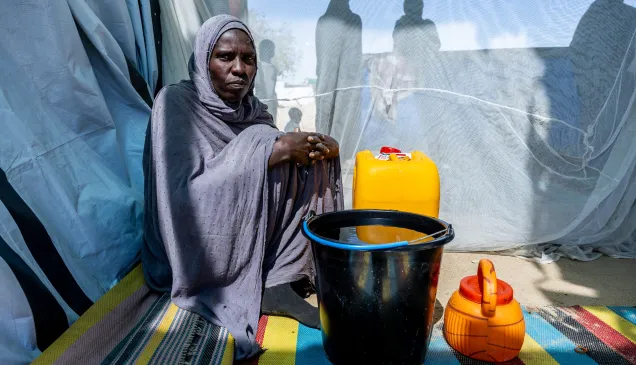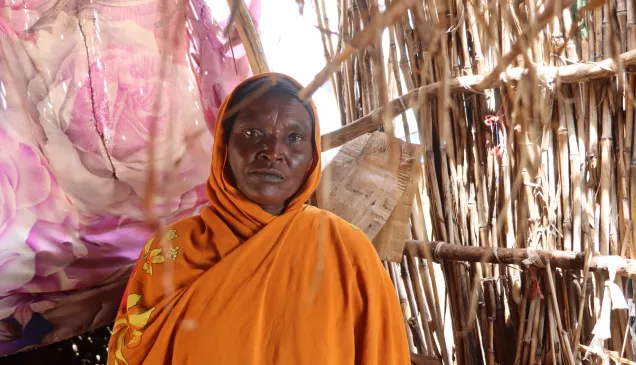Frequently asked questions: Our work in Sudan

The International Committee of the Red Cross (ICRC) has been present in Sudan since 1978, assisting people affected by conflict in areas such as Darfur, Blue Nile, South Kordofan, and Eastern Sudan.
In our efforts to support communities impacted by armed conflict, the ICRC works both independently and in cooperation with the Sudanese Red Crescent Society (SRCS). Together, we provide hospitals with essential equipment and supplies, collaborate with local water authorities to improve access to clean water, and support institutions that offer rehabilitation services for people with disabilities.
The ICRC also helps families separated by conflict or displacement to restore contact and facilitates the release of detainees at the request of the concerned parties. In addition, we promote respect for International Humanitarian Law (IHL) and monitor its implementation by all sides of the conflict. Learn more about our work in Sudan here.
All services provided by the ICRC are free.
Information for people affected by armed conflict
-
The ICRC aims to meet the most urgent humanitarian needs of people affected by the ongoing conflict in Sudan. Our work is guided by the principles of humanity, impartiality, independence, and neutrality. The criteria to provide protection activities, aid and services to people affected by conflict are based solely on needs, and without discrimination, whether by religion, ethnicity, gender or political affiliations. We make these decisions independently.
We place people affected by conflict at the center of our work, recognizing them as the primary experts on their own situations. In our programs, communities are involved from the start. We do our best to consult them during surveys and interviews when assessing who is most affected, what their specific needs are, and who has more challenges.
Their perspectives help shape the design of our services. Once a community is identified as requiring a specific type of protection or assistance, we coordinate with local partners to help verify and monitor that aid is being distributed fairly. Feedback from affected people is always welcome and helps us improve services and ensure that we are not excluding the most vulnerable people.
Please click here to explore the impact of our work in Sudan from January to June 2025. You can also view our 2024 impact highlights through this link.
-
International humanitarian law (IHL) includes key provisions aimed at preventing the displacement of civilians and mitigating the suffering it causes. When displacement does occur, IHL requires that internally displaced persons (IDPs) be protected and assisted throughout all stages of their displacement.
The ICRC recognizes that displaced people often face heightened hardship and threats to their safety and dignity - from difficulties meeting basic needs to tensions with host communities, unsafe living conditions, and the risk of being forced to return to insecure areas. Our response focuses on helping displaced people meet their specific needs while also supporting host communities affected by displacement and assisting those at risk of being displaced.
In partnership with the Sudanese Red Crescent Society, we prioritize the most vulnerable and hard-to-reach communities. Together, we deliver essential medical supplies and operational support to health facilities, assist disease prevention and response teams – including those tackling cholera - and provide multipurpose cash assistance to thousands of households. We also help restore access to clean water systems and facilitate phone calls for families separated by conflict.
Through these efforts, the ICRC and SRCS aim to preserve life, alleviate suffering, and restore dignity for displaced communities amid the ongoing crisis.
-
Being separated from a loved one without knowing where they are or what has happened to them is one of the hardest things any family can endure. Every person has the right to know the fate and whereabouts of their missing relatives, and to be kept informed about efforts to find them.
The ICRC and the National Red Cross and Red Crescent Societies have registered tracing requests of about 10,000 missing people in Sudan and abroad. Together with the Sudanese Red Crescent Society, we have been working to restore and maintain family links – helping to trace missing persons, reconnect loved ones, and share news that can bring comfort, relief, or closure.
If you have lost contact with a family member during the conflict in Sudan, contact the ICRC, or your local Red Cross or Red Crescent society to request help in tracing them. We apologize if you experience delays in reaching us due to high call volumes. Please be assured that your request is important to us, and we will endeavor to respond as promptly as possible.
If you are inside Sudan, call the ICRC Restoring Family Link Helpline numbers at +249 900 907 832 or 60222. Our working hours are Sunday to Thursday from 08:30 to 15:30, Sudan Local time. You can also send an email to kha_tracing_services@icrc.org. -
We understand how difficult it is to wait for news about your loved one, and we sincerely regret any delays in providing updates. Restoring family links is a process that can take time, especially in times of conflict. The complexity of the situation, including difficulties in accessing some areas and large population displacements within the country and across its borders, is impacting the search process.
We are also receiving a high volume of requests from people looking for their loved ones, and our teams are doing their best to collect and analyze them. Please know that we are committed to working with you and your family for as long as it takes.We will contact you as soon as we have substantial information to share. We appreciate your patience as we work to assist as many people as possible.
-
We acknowledge how difficult and distressing this situation is, and how worried you may be for your safety and that of your loved ones. Regretfully, the ICRC is not able to help individuals or groups leave Sudan, nor can we provide financial or logistical support to reach the border or travel to other countries. This is beyond our current capacity and mandate.
We regret that we cannot offer this kind of assistance, and we sincerely hope you are able to remain safe and find the support you need.
-
The ICRC is not directly conducting medical evacuations or providing support to individual cases. Our role is to support local health authorities and hospitals. We do this by providing them with technical and material assistance for the evacuation of the wounded, and by helping several health facilities across the country deliver essential healthcare and surgical services.
The ongoing hostilities have had a devastating impact on Sudan’s healthcare system, resulting in the destruction of facilities, acute shortages of medical supplies, and a lack of qualified medical staff. It is estimated 70% to 80% of health facilities in the hardest-hit areas are no longer functioning, forcing many people to undertake long and dangerous journeys to reach medical care.
To help bridge this gap, the ICRC provides essential medical supplies and deploys mobile surgical teams to strengthen the capacity of existing hospitals to treat the war-wounded.
-
The UNHCR in Sudan leads in the protection of refugees and asylum seekers, and the ICRC closely follows the work of the agency and maintains full independence from that body. When refugees and asylum seekers happen to be in a country affected by conflict, the ICRC considers them part of the civilian population that the ICRC is entrusted to protect and assist.
Through the global family links network of the Red Cross movement, we offer services, including aiding unaccompanied children in finding their families, especially if they are in different countries. Furthermore, the ICRC is also involved in addressing cross-border tracing and family link requirements. In 2024 the ICRC and National Red Cross and Red Crescent Societies facilitated 400,000 phone calls for Sudanese refugees in South Sudan, Chad, Egypt and Ethiopia trying to reestablish contact with their family members in Sudan.
-
The ICRC closely follows the situation of detainees with those in charge of places of detention in Sudan with the aim of ensuring that detainees are treated humanely, have dignified material conditions and are afforded due process. While the ICRC in Sudan does not have any access to those places of detention, we have received encouraging indications and remain hopeful that visits will begin soon.
-
The ICRC serves as a neutral intermediary between the parties to the conflict, maintaining dialogue with all sides to facilitate the release of persons deprived of their liberty in relation to the conflict. Such releases take place only upon explicit requests and agreements between the parties involved in the conflict. While the responsibility for releasing detainees rests with the parties themselves, the ICRC ensures that every release is carried out safely and with the full consent of the detainee.
-
ICRC’s primary concern is the protection and well-being of civilians. We take allegations of IHL violations seriously and constantly remind all parties to the conflict of their obligation to take all feasible precautions to prevent harm to civilians and civilian objects during military operations.
We actively monitor compliance with IHL and whenever possible engage directly and confidentially with parties involved in conflicts to remind them of their legal obligations. Confidential dialogue is the ICRC's preferred means of working because it allows us to talk candidly with parties to an armed conflict. It allows us to build trust, gain access, and ensure the security of both our staff and the people we are trying to help.
The ICRC does not refrain from public comment, yet it avoids making one-sided condemnations of individual parties to a conflict. By adopting this approach, we avoid the risk of politicizing humanitarian issues through public debate. While we might be criticized for this approach, our ultimate objective – providing humanitarian and protection assistance – must not be jeopardized by public declarations. Refer to the Q &A on confidentiality to learn more.
Other useful information
-
The ICRC and the SRCS are both part of the International Red Cross and Red Crescent Movement and guided by the same Fundamental Principles. We work closely together, but our roles differ. The SRCS focuses on humanitarian activities within Sudan, while the ICRC has an international mandate to protect and assist people affected by armed conflict and other situations of violence.
The SRCS plays a critical role in responding to the crisis in Sudan by providing humanitarian assistance to communities affected by the conflict, despite operating in extremely volatile security environments and with minimal resources. SRCS staff and volunteers take significant personal risks daily to alleviate the suffering of the population. The ICRC supports the SRCS in these efforts by providing technical advice, capacity building particularly on humanitarian forensics, and material support to enhance their ability to manage human remains and identify the deceased.
In response to the current crisis, we have strengthened our collaboration with the SRCS to address the humanitarian needs of the communities most affected by the conflict. The ICRC also coordinates its efforts with other components of the Red Cross and Red Crescent Movement, as well as with humanitarian organizations operating in Sudan and neighboring countries.
-
The ICRC does not conduct espionage activities. It would go against all legal norms, as well as our principles, to engage in such activities. Our mission is to protect the lives and dignity of victims of armed conflict and other situations of violence and to provide them with assistance.
In fact, the ICRC's code of conduct emphasizes the duty of discretion and maintaining confidentiality when it comes to the information we acquire in the course of our work. This code of conduct applies to anyone working for the ICRC; that means all employees, including consultants and volunteers, are all required to treat such information confidentially and are bound by an obligation similar to professional secrecy.
-
The ICRC is a neutral humanitarian organization whose mission is to protect the lives and dignity of victims of armed conflict and other situations of violence and to provide them with assistance. To do this effectively, we must be able to work in dangerous environments often on or across frontlines and engage with all parties involved in a conflict. Our presence and access are only possible when all sides trust that we are neutral and focused on humanitarian needs.
It is imperative that we are in continuous dialogue with all parties to conflicts to advocate for respect for international humanitarian law. Our neutrality is an operational necessity which allows us to build trust and access those in need, even in the most difficult situations. Engaging with all parties allows us to negotiate safe passage for civilians and aid, facilitate the exchange of remains, reunite families separated by conflict, and raise concerns about detainee treatment and the conduct of hostilities. Learn more about ICRC’s neutrality.
-
We understand how difficult it can be to see uncollected bodies in your area. Please report the situation to the nearest authorities, particularly the local police, and request the removal of the remains, especially if they are on private property.
Handling human remains involves legal procedures, so please:
-
Do not touch or attempt to move the bodies.
-
Leave them undisturbed until the authorities arrive.
-
Wait for official instructions before taking any action.
For further guidance, you may contact the ICRC’s dedicated hotline at: +249 900 90 7832
-
-
Your safety is the most important thing. If there is shelling nearby, try to find lower ground and take cover, while also staying away from windows.
-
Lie down, wrap your arms around your head, and cover your ears.
-
Open your mouth to avoid internal injuries; it can reduce the impact of explosive waves on your body.
-
Wait until the shooting is over before you move to a safer shelter.
-
If you find strange metallic objects such as bullets and shells, please keep your distance and do not touch them. They can cause injury or even kill.
-
-
We truly appreciate your interest in supporting humanitarian work in Sudan. While the ICRC does not recruit volunteers, the Sudanese Red Crescent Society (SRCS) has a wide volunteer network that is the backbone of its activities. If you would like to volunteer, please visit the SRCS website to learn more about their volunteer opportunities and find the official contact information.
If you are interested in working with the ICRC, there are several ways to get involved. You can read more about career paths at the ICRC here and explore our current job openings. Recruitment is carried out through a transparent, merit-based process to ensure fairness and the selection of the most qualified candidates.
-
We understand how important it is to have accurate and reliable information, especially in times of crisis.
If you are inside Sudan, you can reach the ICRC directly at: +249 123 044 533 / +249 912 161 202
To stay informed about our activities and updates:
-
Follow our official Facebook page and ICRC Sudan page on X (formerly Twitter). You can also send us messages on these social media pages.
-
Visit the ICRC official website for comprehensive information about our operations in Sudan, available in multiple languages, including English and Arabic.
If you are in a neighboring country, you may use the contact numbers provided below. Please note that some lines may be operating at limited capacity.
In Chad: Contact The Red Cross of Chad via +235 225 234 34 OR +235 666 149 68 OR +235 663 294 52 OR +235 954 096 63.
In Ethiopia: Contact the International Committee of the Red Cross (ICRC) in Ethiopia: 9167 (toll-free number) or +251 116 478 300. You can also contact the Ethiopian Red Cross via +251-115 527110
In Egypt: Contact the Egyptian Red Crescent via +20 225 985 555 OR +20 226 703 979 OR +20 226 703 981 OR +20 226 703 983. If you are near Arqin or Qastal border points in Egypt, contact the Egyptian Red Crescent via 15322. You can also send a WhatsApp message to +20 115 207 2077.
In South Sudan: Contact the International Committee of the Red Cross (ICRC) in South Sudan via +211 912 170 275 OR +211 977 151 889. You can also contact the South Sudan Red Cross via +211 914 992 755 OR +211 926 255 358 -
Take care before you share
If you come across content on social media that you believe to be false or misleading, you can report it directly to the relevant platform.
You can also help slow the spread of misinformation by checking the veracity of questionable information before sharing it with others.
We strive to treat you with respect and dignity
All services provided by the ICRC are free.
Everyone who works with the ICRC (our staff, partners, and suppliers) must always treat you with respect and dignity.
It is forbidden for ICRC employees and our partners to ask for money or any type of favours in exchange for aid. We encourage all to report in good faith suspicion of fraud, corruption, sexual exploitation and abuse, sexual harassment and other suspected misconduct.
You have the right to report cases of inappropriate behaviour or illegal actions on the part of the ICRC.
To do so, you can email us at: code_of_conduct@icrc.org. You can also report it directly in the Integrity Line (available in English, French and Spanish).



